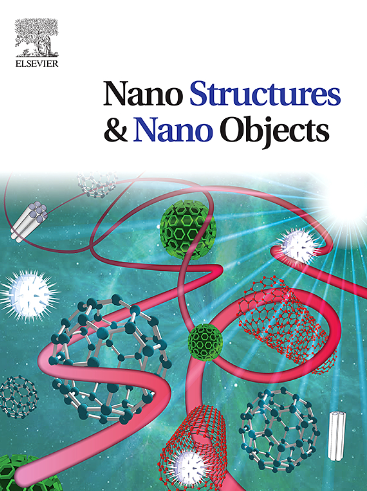嵌入颗粒形状和热辐射的旋转几何体上 Fe3O4-Cu/H2O 混合纳米流体流动和传热的意义
IF 5.45
Q1 Physics and Astronomy
引用次数: 0
摘要
本研究旨在探索辐射混合纳米流体在旋转拉伸片上的三维磁流体力学(MHD)达西-福克海默流动。研究还考虑了热辐射和颗粒球形形状的影响。目前研究将铜(Cu)和氧化铁(Fe₃O₄)纳米粒子分散在水(H₂O)中,形成用于分析的混合纳米流体。惯性力和热辐射的影响也被纳入了能量方程。数学模型由偏微分方程(PDE)组成。通过相似变换转换成常微分方程。在 bvp4c 和 MATLAB 算法的帮助下,获得了这些 ODE 的数值和图形解决方案。结果表明,当磁性参数、孔隙度参数、旋转参数和惯性系数的输入值较大时,对 x 分量速度曲线的影响下降,而对 y 分量速度曲线的影响则相反。根据数据,结果显示在 λ=0.3 时,从纳米流体过渡到混合纳米流体时,传热效果提高了 39.1%。此外,当磁场强度从 0.5 增加到 2.0 时,热传导量减少了 36%。此外,还观察到温度曲线随旋转参数和辐射参数的变化而上升。将目前的结果与之前的结果进行比较,结果显示两者吻合良好。本文章由计算机程序翻译,如有差异,请以英文原文为准。
Significance of Fe3O4-Cu/H2O hybrid nanofluid flow and heat transfer over a rotating geometry embedded with particle shape and thermal radiation
The current study aims to explore the three-dimensional magneto-hydrodynamic (MHD) Darcy-Forchheimer flow of radiative hybrid nanofluid over a rotating stretching sheet. The investigation also considers the impact of thermal radiation and the spherical shape of the particles. Present examinations copper (Cu) and iron oxide (Fe₃O₄) nanoparticles are dispersed in water (H₂O) to form the hybrid nanofluid used for analysis. The influence of inertial force and thermal radiation also incorporated in the energy equation. The mathematical model which comprised of partial differential equations (PDEs). Transformed into ordinary differential equations (ODEs) via similarity transformations. The numerical and graphical solutions of these ODEs are obtained with the help of bvp4c and MATLAB algorithm. The outcomes signify that the effect on the velocity profile of x-component is decline when large input values of magnetic parameter, porosity parameter, rotation parameter and inertial coefficient and opposite behaviors show in y-component of velocity profile. Based on the data, the results reveal a 39.1 % enhancement in heat transfer when transitioning from a nanofluid to a hybrid nanofluid at . Additionally, a 36 % reduction is observed as the magnetic field strength increases from 0.5 to 2.0. Also, observe that temperature profile boost up against rotation parameter and radiation parameter. Present results are compared with the previous ones shows good agreement.
求助全文
通过发布文献求助,成功后即可免费获取论文全文。
去求助
来源期刊

Nano-Structures & Nano-Objects
Physics and Astronomy-Condensed Matter Physics
CiteScore
9.20
自引率
0.00%
发文量
60
审稿时长
22 days
期刊介绍:
Nano-Structures & Nano-Objects is a new journal devoted to all aspects of the synthesis and the properties of this new flourishing domain. The journal is devoted to novel architectures at the nano-level with an emphasis on new synthesis and characterization methods. The journal is focused on the objects rather than on their applications. However, the research for new applications of original nano-structures & nano-objects in various fields such as nano-electronics, energy conversion, catalysis, drug delivery and nano-medicine is also welcome. The scope of Nano-Structures & Nano-Objects involves: -Metal and alloy nanoparticles with complex nanostructures such as shape control, core-shell and dumbells -Oxide nanoparticles and nanostructures, with complex oxide/metal, oxide/surface and oxide /organic interfaces -Inorganic semi-conducting nanoparticles (quantum dots) with an emphasis on new phases, structures, shapes and complexity -Nanostructures involving molecular inorganic species such as nanoparticles of coordination compounds, molecular magnets, spin transition nanoparticles etc. or organic nano-objects, in particular for molecular electronics -Nanostructured materials such as nano-MOFs and nano-zeolites -Hetero-junctions between molecules and nano-objects, between different nano-objects & nanostructures or between nano-objects & nanostructures and surfaces -Methods of characterization specific of the nano size or adapted for the nano size such as X-ray and neutron scattering, light scattering, NMR, Raman, Plasmonics, near field microscopies, various TEM and SEM techniques, magnetic studies, etc .
 求助内容:
求助内容: 应助结果提醒方式:
应助结果提醒方式:


